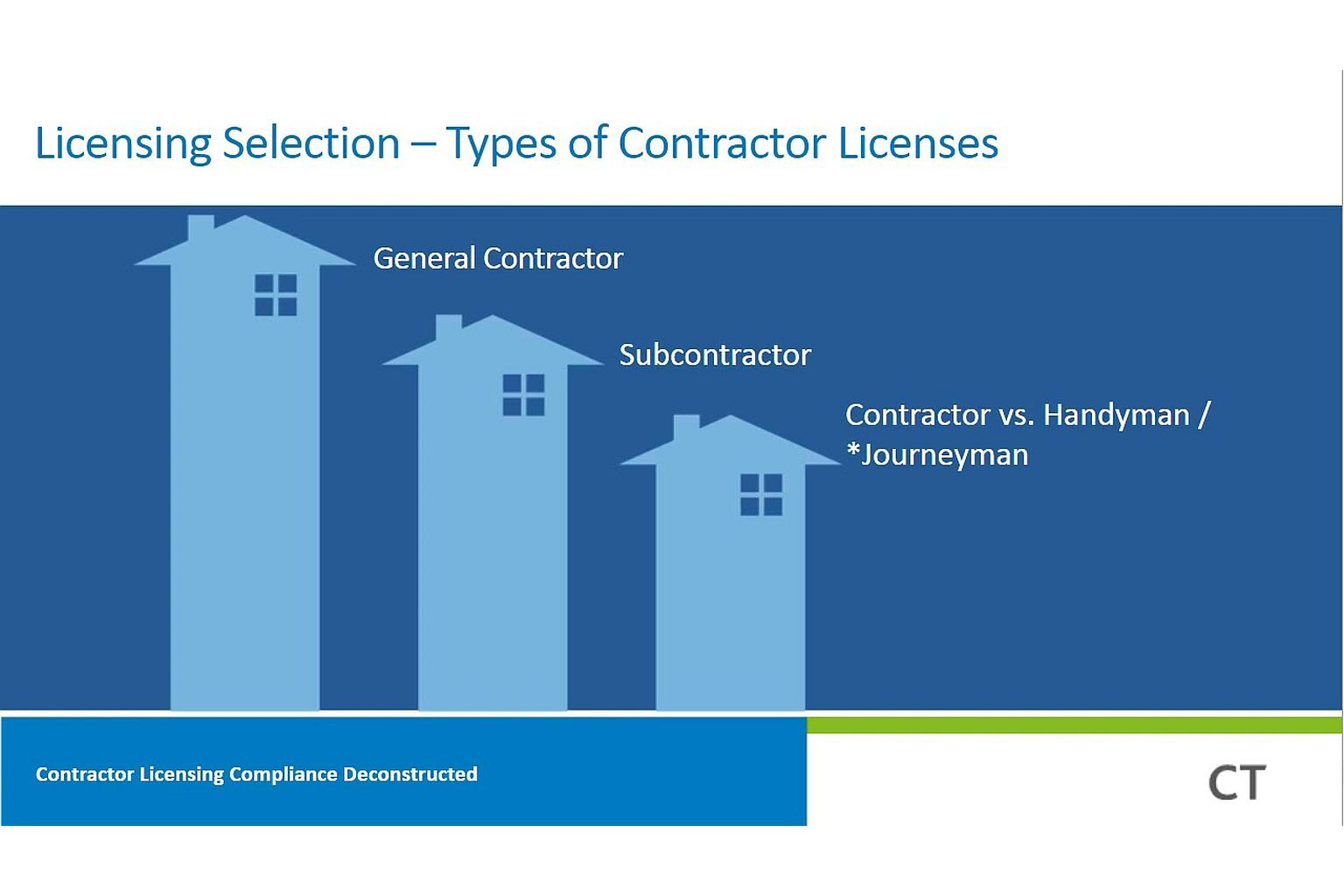Contractor licensing compliance is one of the most crucial steps in becoming a lawful construction business. Holding the proper license(s) lets your customer and prospects know that you’re a professional organization with a degree of expertise and helps to protect your payment rights. In some jurisdictions it is illegal to operate without a required license.
Business license pitfalls for construction companies
Heavy regulations by state and local governments can mean huge compliance challenges for small- to mid-sized construction companies. These requirements are often tedious and complex in nature; companies often do not allocate enough time and resources to ensure they are complying.
Failure to keep up with compliance responsibilities can lead to major consequences. These may include losing the opportunity to bid on a project, financial penalties, cessation of business, criminal and administrative sanctions, and failure to enforce payment rights.
In this article, we explore several major licensing pitfalls for construction companies.
Multi-jurisdiction licensing
The most difficult piece of the compliance puzzle is when projects straddle multiple states or different jurisdictions within the same state.
License requirements for residential and commercial general contracting work can vary at both the state and local levels. Many states require that a general contractor be licensed at the state level. These rules can affect a company’s ability to bid successfully on a project, and they may also apply to the division of work being performed.
In some states, general contractors are licensed at the local level, not the state level. Cities and counties require permits and may require additional licenses beyond state certification. Because legal regulations are constantly changing, you should periodically check the status of your company’s licenses and permits, and the requirements of the work being performed.
Below are some additional multi-jurisdictional business license nuances that you should be aware of.
Specialty contractors and subcontractors
In addition to contractor licenses, certain states require electricians, HVAC workers, or other skilled trade personnel to obtain state certification — if they are not working under the supervision of a general contractor. Other states require these subcontractors to obtain licenses whether they are working under supervision or not.
Specialty work that was previously considered to be within the scope of an existing license classification may now require its own separate license. For example, in many states, solar work that was previously covered under an electrical contractor license may now require its own specialized license. Requirements for this and other types of specialty work should be checked periodically.
Subcontractors may need state contractor licenses even when working under the supervision of a general contractor. Failure to comply can have significant consequences. In California, a subcontractor had to cease work on a $100 million contract and pay a $200,000 fine for failing to have a state contractor license. Furthermore, the main contractor (who had a valid state contractor license) was also penalized to the tune of $10,800 for working with an unlicensed contractor.

Bidding and license requirements
Some states require that you obtain the necessary licenses before bidding on larger projects.
For example, Mississippi requires license numbers for public project bids above $50,000 and private project bids above $100,000 on the front of the bid envelope. Louisiana requires a license prior to bidding on projects over $50,000.
Bidding on or completing construction projects that fall outside of your license classification or specialty license is a common cause of non-compliance, potential sanctions, and citations. For instance, if you hold a C-5 framing and rough carpentry specialty contractor license in California but are performing work on a project that would require a C-9 drywall specialty contractor license, you risk non-compliance.
Therefore, it is important that you have licensed qualifiers represented in all the specialties for the work you are performing.
If your company is working with a subcontractor on a project, it is a best practice to verify the status of their licenses. If your company is contracting with an unlicensed subcontractor, there are many jurisdictions that impose the same penalty as operating without a license yourself.
Reciprocity
Some states have formal reciprocity agreements with other states, making it easier for licensed contractors to obtain a license in another state. Reciprocal agreements are usually limited to only a few states. For example, Arizona has a reciprocity agreement with California, Nevada, and Utah.
A state can waive the usual requirement of a state trade exam if a contractor meets certain criteria — such as holding an active license in good standing over several years — when applying for a license from a select list of classifications. The state may still retain the right to require the exam, and the applicant may still be required to take certain portions of the exam.
Criteria for license requirements
The following three criteria can help you figure out if a license is required:
- The amount of money you’ll receive for the job once completed
- Your role in the project and if you’re working under general contractor supervision (general contractors, subcontractors, or specialty contractors)
- If you’re bidding on a job outside of your home state. This applies before bidding and can carry civil and criminal penalties if the proper licenses are not in place.
Sales tax rule complexities for construction
It’s important to understand the impact of tax rules and regulations before you get hit with an audit.
In most states, construction contractors must pay sales tax when they purchase materials used in construction. This means that any materials and supplies purchased are taxable at the time of purchase.
However, you won't have to pay sales or use tax upon the sale of the finished construction.
A few states treat construction contractors like resellers, who purchase materials solely for resale to an end user. These states do not require that the contractor pay sales tax when purchasing materials.
In addition, states that require construction contractors to pay sales tax on purchases may provide exemptions to this general rule. Whether you qualify for the exemptions will depend on the type of contracts that you negotiate with your clients and who your clients are (for example, are they non-profit or governmental agencies).
Subcontractors may have sales tax liabilities
Subcontractors are hired by the prime contractor and have little, if any, contact with the customer. The payment received will typically come from the prime contractor. But, as a subcontractor, you'll still be treated like an end consumer and must pay sales and use taxes when purchasing supplies and materials.
The five states that don't tax construction contractors when they purchase supplies and materials (Arizona, Hawaii, Mississippi, New Mexico, and Washington) often provide an exemption for sub-contractors.
Still, in some states, you're not completely off the hook for sales taxes as a subcontractor. In Mississippi, for example, if the prime contractor doesn't pay tax on that portion of the job that you worked on, you're on the hook for it!
If you happen to take a subcontracting job in any one of the five states that treat contractors as resellers, make it a point to check out the state laws to see what your liability for state sales and use tax is when the prime contractor doesn't pay. Remember, if the prime contractor files for bankruptcy or otherwise dissolves, you don't want to get stuck paying an unplanned-for tax bill.
Undocumented workers and E-Verify
E-Verify is an electronic employment verification program through which employers may confirm the eligibility of their employees to work in the United States. Although E-Verify started as a voluntary program (except for federal contractors), it has become mandatory for many employers in several states.
Because E-Verify rules vary by state it’s important that you understand what’s required in the state where you operate. These requirements also change often. In Florida, for example, beginning in 2021, any employer, contractor, and subcontractor engaged in public projects must use E-Verify to confirm new employee eligibility.
Why is this important? A failure to comply with E-Verify requirements can result in the suspension or termination of business licenses.
Note: Your company may also have to deal with state legislation that limits the ways in which you can verify an employee’s legal status. For example, California’s Immigrant Worker Protection Act (Assembly Bill 450) makes it unlawful to use the federal E-Verify system for existing employees, except as mandated by law. Any non-compliance with the Act could result in monetary fines of up to $5,000 for the first violation and up to $10,000 for subsequent violations.
Worker misclassification
The misclassification of employees as independent contractors is a common violation that the Department of Labor and the IRS takes very seriously. Political leaders also zero in on worker misclassification.
It’s a serious problem for construction companies. In Nevada, it was estimated that more than 12,000 construction workers (about 11% of industry employees) were misclassified or working off the books.
Fines can be significant. In California, employers can be fined up to $25,000 plus unpaid payroll taxes incurred because of the misclassification. New Jersey and New York City also have hefty fines.
Contractor beware
You may think the chances of getting caught for business license violations are slim, but organizations like the Contractors State License Board (CLSB) in California strictly enforce state contracting laws. Their fraud team conducts weekly sting operations on construction sites across the country to uncover companies that are operating without the proper business licenses.
Managing construction compliance
With constantly changing regulations on the local, state, and federal levels, compliance is a time-consuming process. That’s why it’s critical to have a system in place to ensure you are staying in compliance at all times during a project, not just before work starts. Your site manager may be great at dealing with compliance, but many times competing priorities make it too much for one person to handle.
You may feel handling your compliance issues is impossible. But software systems can help you keep track of licenses and deadlines, as well as produce detailed reports. You can also work with a reliable service provider to handle the research, track renewal dates, and file your license forms for you.
Learn more
CT is dedicated to helping construction companies handle their business licensing needs. For more information, contact us today or talk to one of our experts at 1-518-451-8000. We are here to help.






